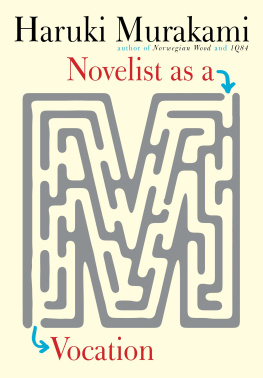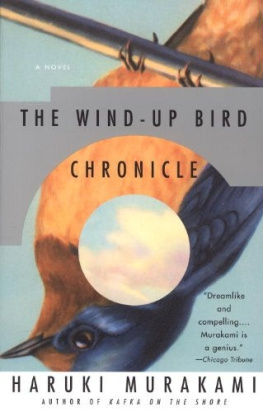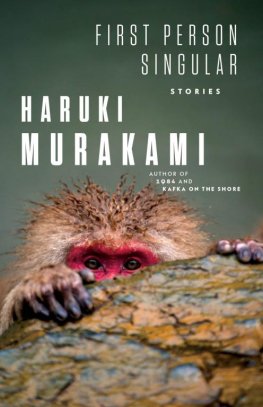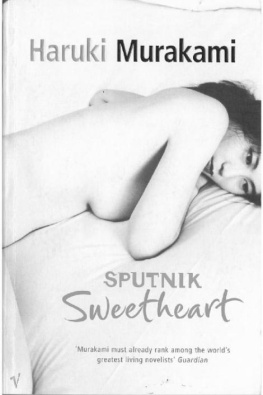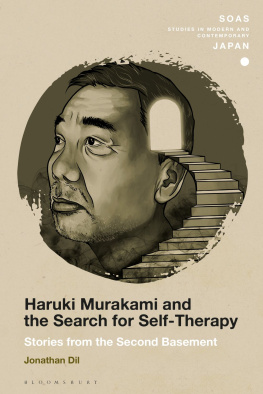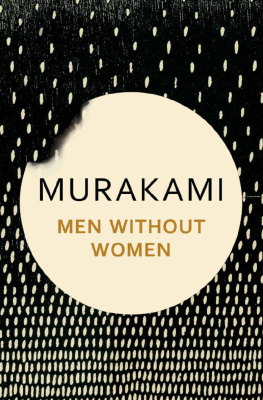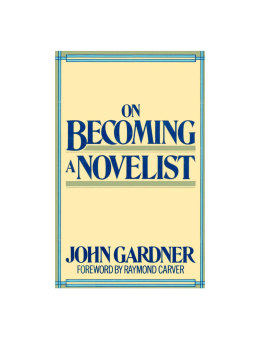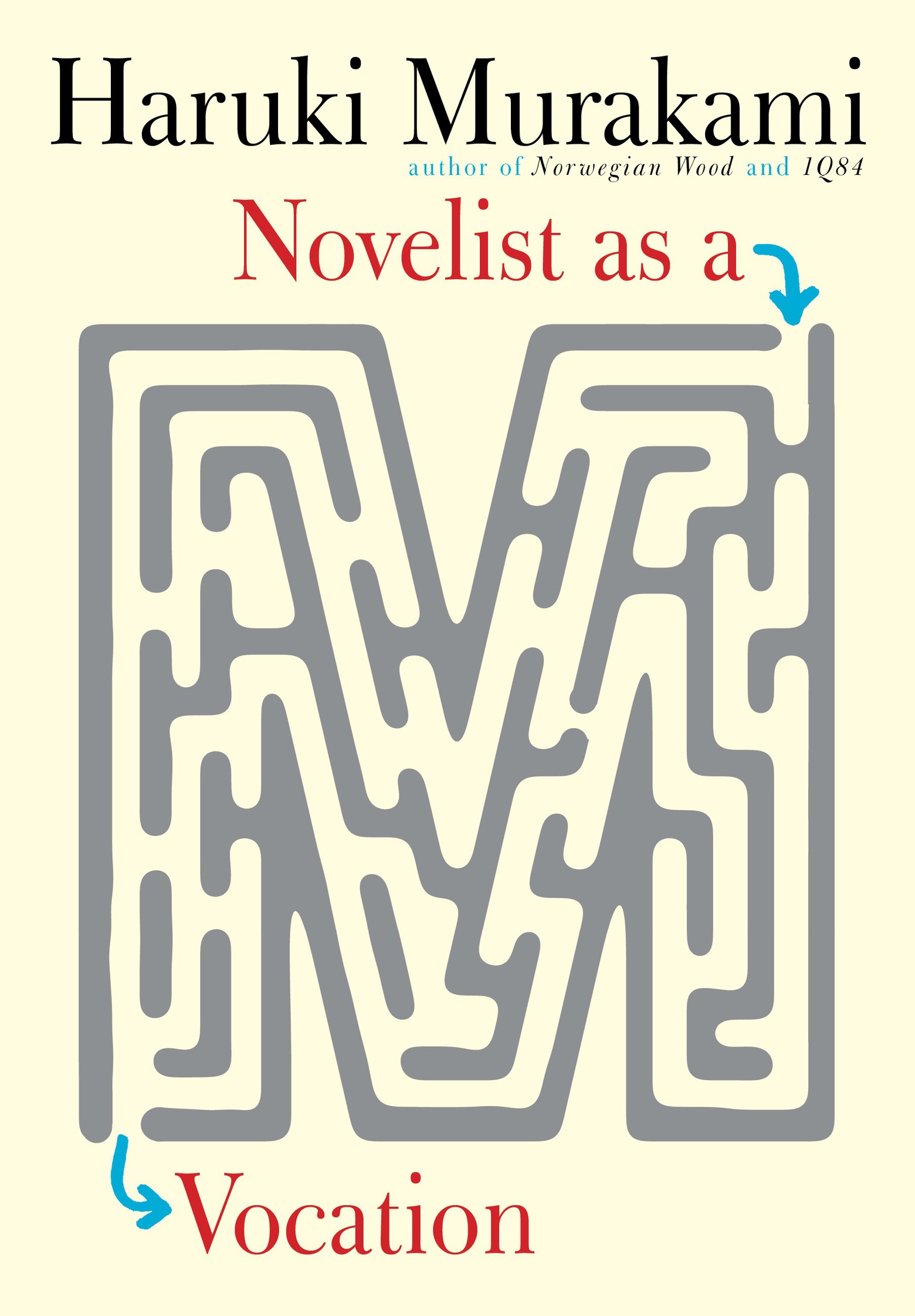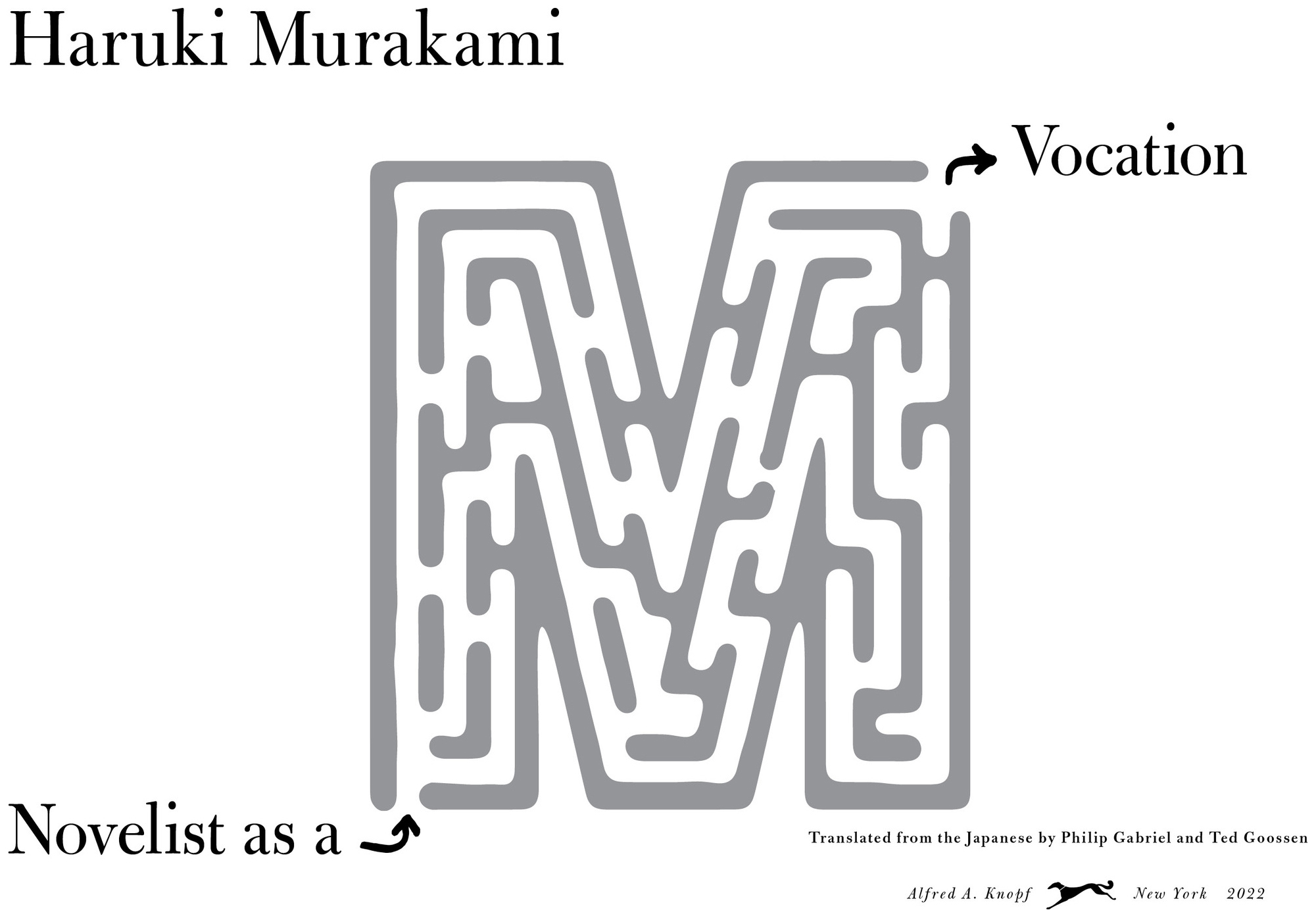Also by Haruki Murakami
Fiction
1Q84
After Dark
After the Quake
Blind Willow, Sleeping Woman
Colorless Tsukuru Tazaki and His Years of Pilgrimage
Dance Dance Dance
The Elephant Vanishes
First Person Singular
Hard-Boiled Wonderland and the End of the World
Kafka on the Shore
Killing Commendatore
Norwegian Wood
South of the Border, West of the Sun
Sputnik Sweetheart
The Strange Library
A Wild Sheep Chase
Wind/Pinball
The Wind-Up Bird Chronicle
Nonfiction
Absolutely on Music (with Seiji Ozawa)
Underground: The Tokyo Gas Attack and the Japanese Psyche
What I Talk About When I Talk About Running: A Memoir
Murakami T
THIS IS A BORZOI BOOK
PUBLISHED BY ALFRED A. KNOPF
Copyright 2015 by Harukimurakami Archival Labyrinth
Translation copyright 2022 by Harukimurakami Archival Labyrinth
All rights reserved. Published in the United States by Alfred A. Knopf, a division of Penguin Random House LLC, New York. Originally published in Japan by Switch Publishing Co., Ltd., Tokyo, in 2015. Copyright 2015 by Harukimurakami Archival Labyrinth.
www.aaknopf.com
Knopf, Borzoi Books, and the colophon are registered trademarks of Penguin Random House LLC.
Library of Congress Cataloging-in-Publication Data
Names: Murakami, Haruki, 1949- author. | Gabriel, Philip, 1953- translator. | Goossen, Ted, translator.
Title: Novelist as a vocation / Haruki Murakami ; translated from the Japanese by Philip Gabriel and Ted Goossen.
Other titles: Shokugyo to shite no shosetsuka. English
Description: First edition. | New York : Alfred A. Knopf, 2022. | This is a Borzoi book
Identifiers: LCCN 2022021694| ISBN 9780451494641 (hardcover) | ISBN 9781101974537 (trade paperback) | ISBN 9780451494658 (ebook)
Subjects: | LCGFT: Essays.
Classification: LCC PL856.U673 S5613 2022 | DDC 895.64/5 23/eng/20220dc06
LC record available at https://lccn.loc.gov/2022021694
Ebook ISBN9780451494658
Cover illustration by Chip Kidd, based on an image by Milos Kojadinovic / Alamy
Cover design by Chip Kidd
ep_prh_6.0_141688264_c0_r0
CONTENTS
FOREWORD
Im not exactly sure when I began writing the series of essays collected in this volume, but I think it was around 2010.
One thing I need to mention is that this book was published in Japan in 2015, so there is a seven-year time lag between that and the present 2022 English translation. Id like you to be aware of this. During these past seven years weve experienced all kinds of crucial events, including the Corona pandemic, and wars breaking out around the world. These circumstances have forced us to make some significant changes in our lives. These essays, though, do not reflect those changes, or the individual changes Ive experienced myself. They are simply my thoughts and feelings as of 2015.
For a long time Ive been wanting to say something about my writing novels, and being a novelist for so long; so in between other work I started, bit by bit, jotting down my thoughts, and organizing them by topic. I didnt write these essays, then, at the request of a publisher, but, rather, on my own initiative, something I wrote for my own sake.
The first several chapters I wrote in my usual stylelike how Im writing herebut when I reread them the flow of the writing seemed stiff and kind of shrill, and it just didnt sit well with me. So I tried writing as if I were directly talking to people, and that way it felt easier to write (speak) more smoothly and honestly; and decided to consolidate the whole thing as if I were writing a speech. I pictured myself speaking in a small hall to maybe thirty or forty people, and rewrote the essays in the more intimate tone youd expect in that kind of setting. Though I never actually had the opportunity to read these essays as talks in front of anyone.
Why not? First of all, I feel a bit embarrassed about talking about myself, and about the process of me writing novels, so directly and openly. I have a pretty strong desire not to try to explain my novels to others. Talking about my own works always comes off sounding kind of apologetic, or boastful, or as if Im trying to justify myself. Even if I dont want to sound that way, it still leaves that impression.
Well, I imagine that someday I might have the chance to talk about this in public, but it might be a little early for it now. Maybe when Im a bit older. Thinking this, I tossed the pages Id written into a drawer. From time to time Id take them out and rework parts of the manuscript. The situation surrounding memy personal circumstances, societal circumstanceswas gradually changing, as was my way of thinking and feeling about things. In that sense the version I wrote in the beginning and the final version here are very different in feeling and tone. Still, my fundamental stance and way of thinking have hardly changed at all. It almost makes me feel like Ive been saying the same things from the time I debuted down to today. When I read what I said over thirty years ago Im surprised, thinking, Wow, its almost exactly what Im saying now!
So I think whats collected here are things Ive been writing and saying over and over (though the form may have gradually changed over time). Many readers might think, Hey, havent I read that somewhere before? and if youre one of them I ask your indulgence. Another motivation for publishing these records of undelivered speeches was a desire to systematically gather all the things Ive said in different places. Id be pleased if readers would take these as a comprehensive look (at the present time) of my views on writing novels.
The first half of this book was serialized in the magazine Monkey Business. Motoyuki Shibata started this new magazine in 2008 (which was to be a new type of more intimate literary journal) and asked me if Id write something for it. I agreed, and gave him a short story, one Id just happened to have finished, and a thought occurred to me and I told him, You know, I have these personal speeches Ive written. If you have space, could you serialize them?
Thats how the first six chapters came to be serialized in each monthly issue of Monkey Business. An easy task, since all I had to do was turn over for every issue something I already had lying dormant in my drawer. In all there are eleven chapters, the first six, as Ive said, serialized in the magazine, the last five written especially for this book.
I imagine this book will be taken as autobiographical essays, but they werent originally written with that in mind. What I was after was to write, in the most concrete and practical way, about the path Ive followed as a novelist, and the ideas and thoughts Ive had in the process. That said, writing novels is nothing less than expressing yourself, so talking about the process of writing means you inevitably have to talk about yourself.
Truthfully, I have no idea if this book could serve as a guidebook or introduction to help those hoping to write novels. What I mean is, Im the kind of person with a very individual way of thinking, and I dont know how far you can generalize about or apply my way of writing and living. I know hardly any other writers, so I dont know how they write, and I cant make comparisons. For me, this is the only way I can write, so thats how I do it. Im certainly not advocating this as the best way to write novels. You might be able to apply some things in my methods, but others might not work so well. It goes without saying, but if you take a hundred novelists youll find a hundred different ways of writing novels. I hope that each of you grasps that and comes to your own conclusions about any applications.

